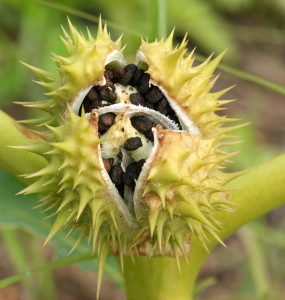Stramonium: is a foul-smelling, erect, annual, freely branching herb that forms a bush up to 2 to 5 ft (60 to 150 cm) tall.
The root is long, thick, fibrous and white. The stem is stout, erect, leafy, smooth, and pale yellow-green. The stem forks off repeatedly into branches, and each fork forms a leaf and a single, erect flower
Contents
Uses
- Stramonium has been used in traditional medicine to relieve asthma symptoms and as an analgesic during surgery or bonesetting. It is also a powerful hallucinogen and deliriant, which is used spiritually for the intense visions it produces. However, the tropane alkaloids responsible for both the medicinal and hallucinogenic properties are fatally toxic in only slightly higher amounts than the medicinal dosage, and careless use often results in hospitalizations and deaths.
Benefits
- Fever: Stramonium is an excellent homeopathic remedy for fever accompanied with an intense thirst. People requiring this medication may experience night frights, be afraid of darkness, have hallucinations, delirium or even feverish seizures. In addition, they may experience involuntary shuddering of the limbs, while their heart and pulse may possibly be in chaos.
- Violence and mania: People who respond best to Stramonium are those who experience excitement accompanied by confusion, stupefaction, terror of darkness and have a propensity to being aggressive. They are also likely to experience squirming, bouts of verbosity and jumbled mumbling. In addition, they may have hallucinations, hear strange imaginary voices and have weird visions. These symptoms may possibly be set off due to the ordeal of childbirth, owing to alcoholism, drug abuse or by further grave conditions, for instance schizophrenia.
- Chorea: People suffering from chorea need Stramonium. In this case, the symptoms may include involuntary jerking and shuddering of the face, limbs or trunk, usually accompanied with stammering. These symptoms may be a result of tremendous fear, an awful effect of vaccination, any head injury or even meningitis. In severe instances, the patient may also experience facial contortion, seizure and/ or epilepsy.
- Asthma: People who have asthma and require Stramonium experience breathlessness, constriction in the chest, or a desiccated, panting cough. The bouts of asthma take place during or after fits of extreme anger or terror. While many people may endure different forms of asthma, generally the symptoms are somewhat familiar. People suffering from asthma may rely on the homeopathic remedy Stramonium to help ease the symptoms of constriction in the chest, dry or breathless cough or the feeling of breathlessness that is generally associated with this condition.
- Bronchitis: Stramonium is an effective remedy for bronchitis, especially when the patients experience wheezing accompanied by shortness of breath or cough that produces yellowish or green phlegm. Such patients may also experience intense anger and fright which may set off or even worsen the symptoms.
Cautions
- None recorded.
Interactions
- When taking any homeopathic remedy, do not use peppermint products, coffee, or alcohol. These products may cause the remedy to be ineffective.
Other names
Other common names for stramonium include thornapple and moon flower, and it has the Spanish name Toloache. Other names for the plant include hell’s bells, devil’s trumpet, devil’s weed, tolguacha, Jamestown weed, stinkweed, locoweed, pricklyburr, and devil’s cucumber
References
Source: Wikipedia, https://en.wikipedia.org/wiki/Datura_stramonium
Herbs2000, http://www.herbs2000.com/homeopathy/stramonium.htm

